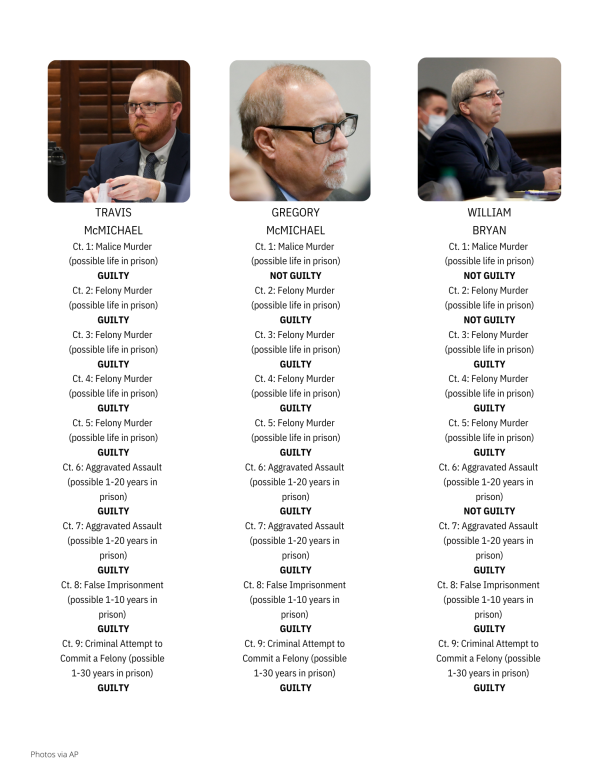The jury in the trial of the three men charged with killing Ahmaud Arbery reached a verdict on Wednesday around 1:30 p.m.
Travis McMichael, who fatally shot Arbery, was guilty of all charges, including malice murder, felony murder, aggravated assault, false imprisonment and criminal attempt to commit a felony.
Gregory McMichael, his father, was guilty of felony murder, aggravated assault, false imprisonment and criminal attempt to commit a felony. He was found not guilty of malice murder.
William Bryan Jr., who joined the McMichaels in their pursuit of Arbery and recorded video of the shooting on his cellphone, was found guilty of three counts of felony murder, one count of false imprisonment and criminal attempt to commit a felony. He was found not guilty of malice murder, one count of felony murder and one count of aggravated assault.
The three men each faced one count of malice murder, four counts of felony murder, two counts of aggravated assault, one count of false imprisonment and one count of criminal contempt to commit a felony.
WABE legal analyst Page Pate broke down the difference between malice murder and felony murder with “All Things Considered” host Jim Burress.
“Malice murder in Georgia is basically where you intend to kill someone and you have no justification,” Pate said. “And the jury clearly thought that’s what happened with Travis McMichael.”
Whereas with felony murder, there isn’t a clear intent to kill someone, according to Pate.
“Felony murder is when you’re committing some other type of offense and somebody dies as a result of it,” he said.
The three defendants will be sentenced to life in prison, but it’s up to the judge in the case to decide whether that sentence will have the possibility of parole, according to Pate.

Trial details
The jury began deliberations on Tuesday and announced their verdict on Wednesday.
Attorneys presented their opening statements in the case on Nov. 5. One Black and 11 white jurors were selected for the panel. Prosecutor Linda Dunikoski noted the discrepancy and argued that defense lawyers struck eight Black potential jurors because of their race, but defense attorney Laura Hogue, who represents Gregory McMichael, said the potential jury panelists were cut for legitimate reasons.
Early in the trial, Glynn County police showed jurors graphic photos of Arbery’s gunshot wounds. Arbery, a Black man, was fatally shot on Feb. 23, 2020, after the defendants, who are all white, pursued him with the impression that he was connected to recent burglaries in the neighborhood.
Jurors were also shown video footage of Arbery roaming a vacant home under construction that he was seen running from the day he was killed. Cameras in the home recorded him visiting five times over the previous several months, and it recorded others visiting the home too. Property owner Larry English said there was no sign Arbery stole anything from the home.
Ricky Minshew, then a Glynn County police officer, testified that he arrived at the scene of the shooting about a minute after he heard the gunshots. Minshew called for 911 operators to send emergency medical responders but said he didn’t have the training or equipment to treat such significant injuries.
Glynn County police officer Jeff Brandeberry later testified that Gregory McMichael changed his story about why he suspected Arbery of criminal activity. McMichael first told Brandeberry that Arbery had been recorded by security cameras breaking into several houses in the area.
McMichael’s account changed when he spoke with a Glynn County detective at police headquarters on the day of the shooting, detective Parker Marcy said. McMichael told Marcy that Arbery had targeted just one home, which was still under construction with no doors or windows, according to Marcy. The detective also told prosecutors that he didn’t see Arbery take anything from the house.
Bryan’s attorney, Kevin Gough, made several controversial statements in the final days of the trial. Gough told the judge he didn’t want “any more Black pastors” in the courtroom after the Rev. Al Sharpton sat with Arbery’s family. The jury was not in the courtroom when he made the comments.
As a response, hundreds of pastors from around the country, most of them Black, descended on the courthouse on Nov. 18. Gough said in court the following day that the rally was comparable to a “public lynching” of the three white defendants, and asked the judge to declare a mistrial. Walmsley quickly dismissed the motion.
>>BURIED TRUTHS: WABE’s award-winning podcast explores key figures and the fascinating history of the Arbery case.
The prosecution rested its case on Nov. 16.
The following day, Travis McMichael — who fatally shot Arbery — testified that he feared the 25-year-old man was armed with a gun when he saw him “creeping” outside an unfinished house.
But under cross-examination from Dunikoski, McMichael admitted that Arbery never reached for or pulled out a weapon.
“He was just running,” McMichael said.
The defense rested its case on Nov. 18. Neither of the other two defendants took the stand.
One main argument made by the defense is that McMichael shot Arbery in an act of self-defense. His attorney, Jason Sheffield, said his client was struck by Arbery at one point, which forced him into a “life-or-death” situation and he grabbed his gun to shoot.
“It is absolutely, horrifically tragic that this has happened,” Sheffield said during closing arguments. “This is where the law is intertwined with heartache and tragedy. You are allowed to defend yourself.”
Another argument made was that the pursuit was legal under Georgia’s citizens’ arrest law at the time. Gregory McMichael initiated the pursuit when he saw Arbery running past his house. Sheffield said Arbery was killed when he violently resisted a legal effort to inquire about the burglaries in the neighborhood.
Also during the closing arguments, Hogue made a statement that drew widespread condemnation.
“Turning Ahmaud Arbery into a victim after the choices that he made does not reflect the reality of what brought Ahmaud Arbery to Satilla Shores in his khaki shorts with no socks to cover his long, dirty toenails,” she said.
Gough, representing Bryan, said his client didn’t know the McMichaels had guns until moments before the shooting.
Further, Gough called it “fate” and “divine providence” that Bryan was in the right place at the right time to document the incident on video.
“He’s being guided, whether that’s by a God if you believe in a God, or by some other entity, but do you really believe it’s just coincidence? Do you really believe Mr. Bryan is trying to lie to you?” Gough said in his closing statement.
In the prosecution’s rebuttal, Dunikoski told the jury that the defendants had no evidence Arbery committed crimes in their neighborhood.
“They made the decision to attack Ahmaud Arbery in their driveways because he was a Black man running down the street,” Dunikoski said. She added: “They shot and killed him. Not because he was a threat to them. But because he wouldn’t stop and talk to them.”
Attorney Alicia Luncheon
Atlanta attorney Alicia Luncheon, a former prosecutor who worked under Dunikowski, told Burress that she did a “beautiful” job explaining the law to the jury.
“I think the jury’s sentences at the verdict did in fact reflect her prosecutorial style and that it did work,” Luncheon said.
The three men still face federal hate crime charges for Arbery’s killing. A judge set jury selection for Feb. 7, 2022 — two years to the month since Arbery was killed.
Case history
Arbery was fatally shot on Feb. 23, 2020. He was running along a residential street in Brunswick, Georgia, when Gregory and Travis McMichael pursued him. During the incident, Travis shot Arbery three times with a shotgun. In police reports, Gregory told police they suspected he was a burglar. William Bryan Jr. took video footage of the incident from his vehicle.
Arrests would not be made for more than two months. Arbery’s family said they were told by law enforcement that he was killed while he was attempting a home invasion that turned fatal. None of the post-shooting details that included a lack of arrest were presented to the jury in the current murder trial.
In the meantime, the case was juggled between three local district attorneys. Brunswick circuit D.A. Jackie Johnson was originally in charge of the case. She recused herself after four days because Gregory previously worked in her office as an investigator.
(In Sept. 2021, Johnson was booked and released from jail after being charged with misconduct in her handling of the case.)
On Feb. 27, 2020, Attorney General Chris Carr appointed Waycross circuit D.A. George Barnhill to handle the case, and he did so until he recused himself on April 7 due to a conflict of interest regarding his son. And, he was under the belief that the shooting was justified — according to a letter he wrote.
Hinesville circuit D.A. Tom Durden had the case for about a month until the video footage of the shooting surfaced on May 7.
The video went viral and sparked a national outcry. Then state authorities took over the case from local law enforcement. On May 7, the McMichaels were arrested and charged with murder and aggravated assault.
The following week, Carr turned the case over to Cobb County D.A. Joyette M. Holmes. (She would lose her seat in the November 2020 election.)
Two weeks later, Bryan, who recorded the killing, was arrested and charged with felony murder and criminal attempt to commit false imprisonment.
The three men were indicted by a grand jury with a total of nine charges on June 24, 2020. They eventually pleaded not guilty to the charges, and were all denied bond.
Two new state laws came after the fatal shooting. On June 26, 2020, the Georgia Anti-Hate Crimes Act was passed. “We saw injustice with our own eyes. Georgians protested to demand action, and state lawmakers rose to the occasion,” Gov. Brian Kemp said. Georgia was one of four states without a hate crimes law until then.
Georgia’s citizen’s arrest law was repealed on May 10, 2021. “Today we are replacing a Civil War-era law, ripe for abuse, with language that balances the sacred right to self-defense of a person and property with our shared responsibility to root out injustice and set our state on a better path forward,” Kemp said.
For a deeper exploration of Ahmaud Arbery’s story, listen to WABE’s podcast, “Buried Truths.” Hosted by journalist, professor, and Pulitzer-prize-winning author Hank Klibanoff, season three of “Buried Truths” explores the Arbery murder and its direct ties to racially motivated murders of the past in Georgia.










